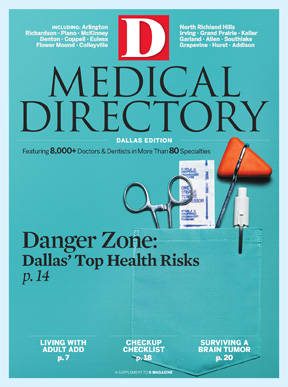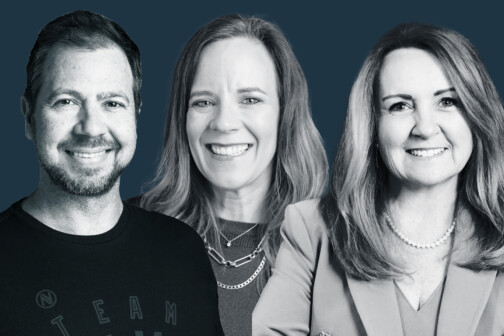Every year, more than 1 million people get cancer. Once the diagnosis is made, new cancer patients spend much of their time researching and undergoing medical treatments—all under the guidance and support of their physicians. But many find that while their medical needs are being treated, they desire additional support for the emotional, nutritional, physical, social, and financial effects brought on by their disease.
Local hospitals, organizations, and treatment centers offer a variety of support groups that address all aspects of cancer for patients and their families. Many find that support groups lead them to the best cancer experts outside of the medical community—the survivors who inspire them to keep fighting.
ARLINGTON CANCER CENTER: Arlington Cancer Center hosts support groups for cancer patients, survivors, and their caregivers during odd-numbered months. Man to Man meets the second Thursday of odd-numbered months; Woman to Woman meets the fourth Tuesday of odd-numbered months. The groups focus on education and discussion about cancer and the effects of the disease on patients, friends, and family members. 800-344-8351 x. 1317; www.acc-tx.com.
BAYLOR CHARLES A. SAMMONS CANCER CENTER AT DALLAS: The Baylor Charles A. Sammons Cancer Center at Dallas offers several programs through the Virginia R. Cvetko Patient Education Center to help cancer patients and their loved ones understand and manage the physical, emotional, and spiritual challenges of cancer. The Cvetko Center staff includes a medical director, nurse educator, chaplains, social workers, and trained cancer survivor volunteers. Cancer patients and their families might benefit from several support programs, including a six-week education and support group, Living With Cancer; Look Good…Feel Better; Wisdom for Women With Cancer; Express Yourself/Healing Through Journaling; Gentle Yoga for Cancer Patients; and a Spanish-language cancer support group. 214-820-2608; www.baylorhealth.com.
CHILDREN’S MEDICAL CENTER: The Center for Cancer and Blood Disorders offers a full spectrum of patient services for children and their families, including patient and family support groups, school re-entry programs, summer camps, teen support groups, music therapy, and retreats. Numerous support groups, fundraising activities, and events facilitated by CCBD allow patients and their families the opportunity to build support networks with other families experiencing similar circumstances. 214-456-2805; www.childrens.com.
GILDA’S CLUB NORTH TEXAS: The mission of Gilda’s Club North Texas is to provide a warm and inviting homelike setting where men, women, and children living with cancer—as well as their families and friends—can join with others to build emotional and social support as a supplement to medical care. Free of charge, nonprofit Gilda’s Club offers support groups, networking groups, lectures, workshops, and social events and facilitates weekly groups for those living with cancer, those who are post-treatment, their family and friends, and those who have lost someone to cancer. Support groups are facilitated by licensed mental health professionals for GCNT members. A part of Gilda’s Club, Noogieland, T. Boone Pickens’ Little Dude Ranch, is specifically designed for children and teens diagnosed with cancer, those who have a family member living with cancer, and those who have had a loss in their family. 214-219-8877; www.gildasclubtx.org.
MEDICAL CENTER OF PLANO: Medical Center of Plano offers a variety of support groups for cancer patients and their families, including a breast cancer support group, yoga program, dialogue cancer support group, Man to Man prostate cancer support group, thyroid cancer support group, and Young Women Matter – A Cancer Support Group. Young women diagnosed with cancer often feel isolated and have little contact with peers who can relate to what they are feeling. This support group discusses the unique challenges facing this younger population. Topics include family, careers, community, fertility, and body image. 214-473-7777; www.medicalcenterofplano.com.
MEDICAL CITY DALLAS: The Medical City Cancer Resource Center, located in the Building A atrium, exists to meet the education and support needs of cancer patients and their families so they can be proactive about their care. The center is dedicated to providing essential information, emotional support, and education to everyone whose life is touched by cancer. With the right resources, patients and their families become empowered to deal with the challenges of cancer. These resources are available at the Medical City Cancer Resource Center: community resources, complimentary therapies, educational materials and classes, genetic counseling, Internet access, oncology-certified nurse, support groups, survivorship support, and wigs/prosthesis. 972-566-5444; e-mail [email protected].
MONCRIEF CANCER RESOURCES: An affiliate of the Simmons Comprehensive Cancer Center at UT Southwestern, this nonprofit, community-based organization provides support services to cancer patients and their families in Tarrant County and surrounding areas. The staff conducts personal assessments of anyone with a cancer diagnosis to help identify problems and construct a plan to improve quality of life during cancer treatment. Social services, genetic counseling, referral services, psychological counseling, educational programs, support groups, nutritional services, and a transportation program are among the offerings. 817-838-4860 or 800-405-7739; e-mail [email protected].
PATIENTS’ COMPREHENSIVE CANCER CENTER: The philosophy of the Patients’ Comprehensive Cancer Center is to provide a range of services to make life easier for patients and their families during a difficult time. PCCC offers support groups, dietary counseling, financial counseling, laboratory services, lodging, massage therapy, gentle yoga, pharmacy, psychologist and social workers, and transportation assistance. Participation is open to all cancer patients and their caregivers, and attendees come from all across the metro area. PCCC has three locations: Carrollton (972-395-1010; www.pccctx.com); McKinney Regional Cancer Center (972-562-9222; www.mrcctx.com); and Texas Hematology/Oncology in Dallas (972-247-5510; www.thoctx.com).
TEXAS HEALTH PRESBYTERIAN HOSPITALS OF DALLAS: Texas Health Presbyterian Hospital of Dallas offers a number of support groups for people living with cancer, as well as family and friends. People in support groups talk about what it is like to have cancer and share tips on ways to cope. Some of the support groups include Cancer Survivors, a peer support group for newly diagnosed patients; Cancervive; CLIMB, for children who have parents with cancer; Look Good … Feel Better to help gain control over the side effects of cancer; Man to Man for newly diagnosed patients with prostate cancer; Pancreatic Cancer Support Group; Reach to Recovery, a rehabilitation program related to breast cancer and its treatment; Us Too!, an interactive support group for men and families facing prostate cancer; and Woman to Woman, for emotional and social support for breast cancer. 877-847-9355; www.texashealth.org.
TEXAS ONCOLOGY: Texas Oncology focuses on the whole person and considers the needs of family members, caregivers, and co-workers. Texas Oncology gives patients access to numerous local and nationwide support programs that can provide information, guidance, and an unparalleled understanding of living with cancer. Patients at Texas Oncology are encouraged to talk to their medical team about their preferences, and they will connect them with the right service. Texas Oncology supports many national cancer organizations’ support groups, including these from the American Cancer Society: I Can Cope; Look Good … Feel Better; Man to Man; Reach to Recovery; and Road to Recovery. 800-ACS-2345; www.cancer.org.
UT SOUTHWESTERN MEDICAL CENTER: Cancer support groups are available at UT Southwestern Medical Center’s Harold C. Simmons Comprehensive Cancer Center. The groups are led by a licensed social worker, and meetings are scheduled regularly for those suffering from all types of the disease: ovarian cancer, thoracic/lung cancer, prostate cancer, breast cancer, and brain cancer. Meetings also assist husbands and partners of women with cancer. 214-645-4673 or 866-460-4673; www.utsouthwestern.edu/utsw/home/simmons.





